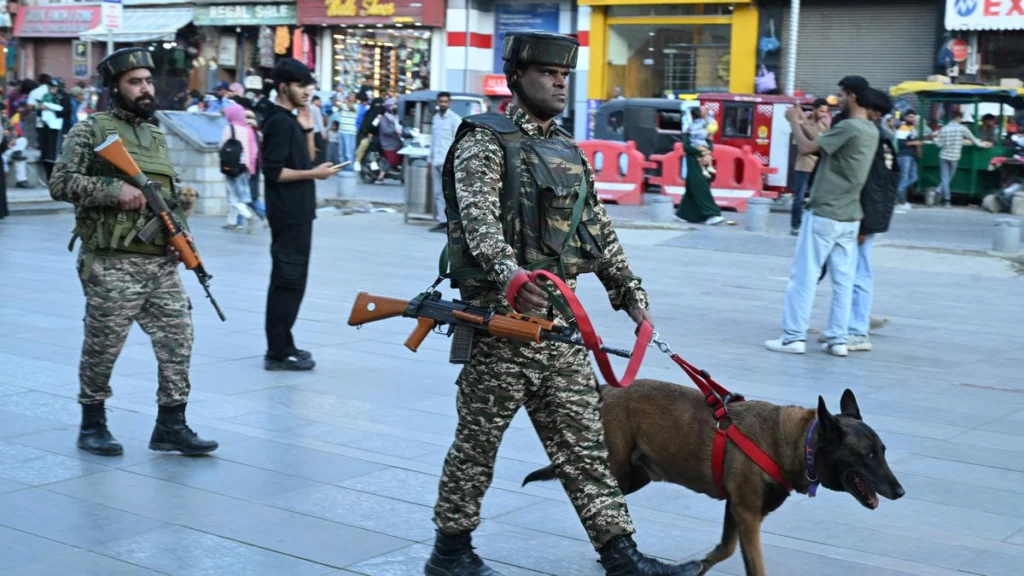U.S. in touch with India and Pakistan; urges work toward ‘responsible solution’

U.S. Expresses Solidarity with India After Pahalgam Terror Attack, Urges Responsible Diplomacy Between India and Pakistan
In the aftermath of a devastating terrorist attack in Pahalgam, Kashmir, the United States has voiced strong support for India while simultaneously urging both India and Pakistan to act responsibly and seek a peaceful resolution amid rising tensions.
The attack, which targeted civilians and security personnel in the popular tourist destination of Pahalgam, has triggered widespread condemnation across the globe. In Washington, the U.S. State Department issued a clear statement standing firmly with India and denouncing the violence in the strongest terms.
“We stand with India and strongly condemn the terrorist attack in Pahalgam,” the State Department spokesperson said on Sunday. The comments echoed similar sentiments recently expressed by President Donald Trump and Vice President J.D. Vance, both of whom had earlier extended condolences to the victims and expressed unwavering support for India’s fight against terrorism.
The spokesperson further emphasized that Washington is maintaining close communication with both New Delhi and Islamabad, urging the two nuclear-armed neighbors to exercise restraint and focus on finding a responsible solution to the escalating situation.
“Terrorism must be condemned wherever it occurs. The United States is actively engaged with both India and Pakistan to encourage dialogue and prevent further escalation,” the spokesperson added.
The Attack and Its Aftermath
The attack in Pahalgam, a picturesque town located in Kashmir’s Anantnag district, resulted in multiple casualties and injuries, shattering the relative calm that had prevailed in the region in recent months. Preliminary reports suggest that heavily armed militants ambushed a group of security forces and civilians, leading to an intense exchange of gunfire.
Authorities in India have condemned the attack as a “cowardly act of terror” and vowed to bring the perpetrators to justice. Indian officials have also pointed fingers at terrorist groups operating across the border in Pakistan, renewing long-standing allegations of cross-border terrorism, a charge Pakistan denies.
The attack has reignited tensions between India and Pakistan, two countries that share a long and troubled history over the disputed region of Kashmir. Diplomatic channels between the two have been strained in recent years, and incidents like this threaten to derail any fragile progress made towards dialogue.
International Reactions
Besides the United States, several countries including the United Kingdom, France, Japan, and Australia have condemned the attack and expressed solidarity with India. In statements issued by their respective foreign ministries, they emphasized the importance of countering terrorism globally and called for justice for the victims.
The United Nations Secretary-General also issued a statement expressing deep concern over the violence and calling on all parties to exercise maximum restraint.
However, it was Washington’s reaction that drew particular attention, given the United States’ historically significant relationships with both India and Pakistan. By condemning the attack unequivocally while also calling for diplomatic engagement, Washington signaled its intent to play a balancing role in the region.
A Call for Responsible Diplomacy
The U.S. State Department’s call for a “responsible solution” highlights Washington’s concern that heightened tensions between India and Pakistan could spiral into a larger conflict. Historically, flare-ups between the two countries, particularly following major terror attacks, have brought the region to the brink of war.
The spokesperson stressed that the path forward should be through diplomacy and dialogue rather than confrontation.
“We urge both India and Pakistan to work towards de-escalation. Regional stability is critical not only for South Asia but for global peace,” the spokesperson said. “We are committed to supporting any efforts that promote a peaceful and secure South Asia.”
U.S. officials have also reportedly reached out to leaders in New Delhi and Islamabad privately, urging caution and offering support for backchannel diplomacy if needed.
India’s Response
Indian Prime Minister Narendra Modi, addressing the nation shortly after the attack, vowed that the country would not bow to terrorism. “India will not forget or forgive. The sacrifice of those we lost today will not go in vain,” Modi declared.
Indian officials have signaled that they are reviewing their options carefully but have not ruled out strong measures against those responsible. Security has been heightened across Jammu and Kashmir, and additional forces have been deployed to sensitive areas.
External Affairs Minister S. Jaishankar also spoke with his counterparts in key countries, seeking global support to pressure Pakistan into cracking down on terrorist groups operating from its territory.
Pakistan’s Stance
Meanwhile, Pakistan’s Ministry of Foreign Affairs issued a statement condemning the loss of innocent lives while rejecting allegations that it had any role in the attack. Pakistan’s leadership emphasized the need for a “constructive approach” and called for a renewed focus on resolving the Kashmir issue through dialogue.
“Blame games will not serve the cause of peace,” a Pakistani official said. “Pakistan stands ready for dialogue but remains committed to highlighting the plight of the Kashmiri people.”
What Lies Ahead
As of now, the situation remains tense but under control. Observers note that the next few days will be critical in determining whether India and Pakistan can avoid another prolonged standoff or conflict.
Washington’s clear message of solidarity with India — coupled with its encouragement for both sides to seek a diplomatic path — reflects a nuanced approach to one of the world’s most volatile regional disputes.
With elections looming in both India and the United States, how the situation evolves could also have political ramifications domestically for both countries.
For now, the world watches closely, hoping that cooler heads prevail and that the tragic events in Pahalgam do not lead to further bloodshed.






